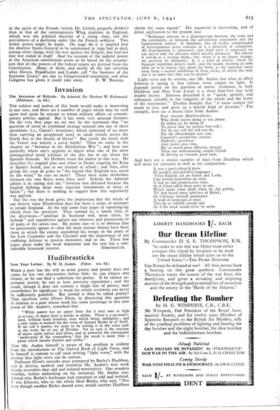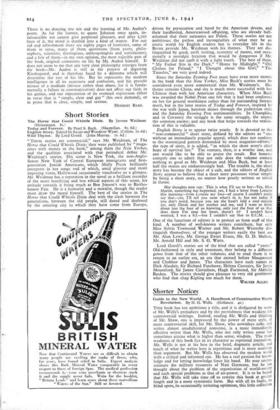Hudibrasticks
New Year Letter. By W. H. Auden. (Faber. tos. 6d.)
WHEN a poet has the will to write poetry and poetry does not come, he has two alternatives before him: he can relapse into silence, or he can find a substitute for poetry. If he cannot ex- perience poetry, he can at least poeticise experience ; and the result, though it does not contain a single line of poetry, may nevertheless be significant (a word for which reviewers can never be sufficiently grateful). But should it then be called poetry? That excellent critic Oliver Elton, in discussing this question in relation to a poet whose work has some parentage to this new poem of Mr. Auden's, remarked that " While poetry has no upper limit (for it may soar as high as it can), its lower limit is harder to define. There is a no-man's- land, without fixed frontiers, over which hangs ambiguity ; and a new name is wanted for the verse of Samuel Butler or of Swift. If we call it poetry, we seem to be setting it in the same rank as the work, let us say, of Dryden. Yet so sure is the reaction of metre upon syntax and idiom, and so powerful the consequent
medication of the atmosphere,' that the result is more than a prose which merely rhymes and rattles."
That Mr. Auden himself is aware of the problem is evident from his introduction to The Oxford Book of Light Verse, and he himself is content to call such writing " light verse," with the proviso that light verse can be serious.
Professor Elton's remarks were prompted by Butler's Hudibras, and in diction, method and intention Mr. Auden's new work closely resembles that odd and isolated masterpiece. One wonders whether, before embarking on his imitation, Mr. Auden con- sidered why Butler's burlesque had remained so odd and isolated. It was Johnson, who op the whole liked Butler, who said, "Nor even though another Butler should arise, would another Hudibras obtain the same regard." His argument is interesting, and of direct application to the present case.
" Burlesque consists in a disproportion between the style and the sentiments, or between the adventitious sentiments and the fundamental subject. It therefore, like all bodies compounded of heterogeneous parts, contains in it a principle of corruption. All disproportion is unnatural ; and from what is unnatural we can derive only the pleasure which novelty produces. We admire it awhile as a strange thing ; but, when it is no longer strange, we perceive its deformity. It is a kind of artifice, which by frequent repetition detects itself ; and the reader, learning in time what he is to expect, lays down his book, as the spectator turns away from a second exhibition of those tricks, of which the only use is to show that they can be played."
Light verse can be serious, says Mr. Auden, but what in effect
Johnson is saying is that serious verse cannot be light. It depends partly on the question of metre. Common to both Hudibras and New Year Letter is a short four-foot line with double rhyme. Johnson described it as " quick, spritely, and colloquial, suitable to the vulgarity of the words and the levity of the sentiments." Dryden thought that " it turns earnest too much to jest, and gives us a boyish kind of pleasure." For example, here are a dozen lines from Auden:
Poor cheated Mephistopheles, Who think you're doing as you please In telling us, by doing ill To prove that we possess free-will ; Yet do not will the will you do, For the Determined uses you, Creation's errand-boy creator, Diabolus egredietur Ante pedes ejus—foe, But so much more effective, though, Than our well-meaning, stupid friends In driving us towards good ends.
And here are a similar number of lines from Hudibras which will serve for criticism as well as for comparison : It was a parti-colour'd dress
Of patch'd and pyball'd languages: 'Twas English cut on Greek and Latin, Like fustian heretofore on satin.
It had an odd promiscuous tone, As if h'had talk'd three parts in one.
Which made some think when he did gabble, Th' had heard three labo'rers of Babel ; Or Cerberus himself pronounce
A leash of languages at once.
This he as volubly would vent
As if his stock would ne'er be spent.
There is no denying the wit and the learning of Mr. Auden's poem. As for the former, to quote Johnson once again, in- exhaustible wit cannot give perpetual pleasure, and after 1,707 lines of it, the mind is dazzled into a kind of stupor. For our aid and refreshment there are eighty pages of footnotes, some of them in verse, many of them quotations (from poets, philo- sophers, scientists, theologians, anthropologists and statisticians), and a few of them—in my own opinion, the most valuable part of the book, original comments on life by Mr. Auden himself. It does not seem to me that any very clear philosophy emerges from the book--Mr. Auden is still in the process of digesting Kierkegaard, and is therefore faced by a dilemma which will determine the rest of his life. But he represents the modern intelligence in all its acuteness and confusion, and his present misuse of a medium (misuse rather than abuse, for it is funda- mentally a failure in communication) does not ;ffect our faith in his genius, and our expectation of its eventual expression either in verse that is " simple, clear and gay " (his own demand), or in prose that is clear, simple, and serious. HERBERT READ.



























 Previous page
Previous page